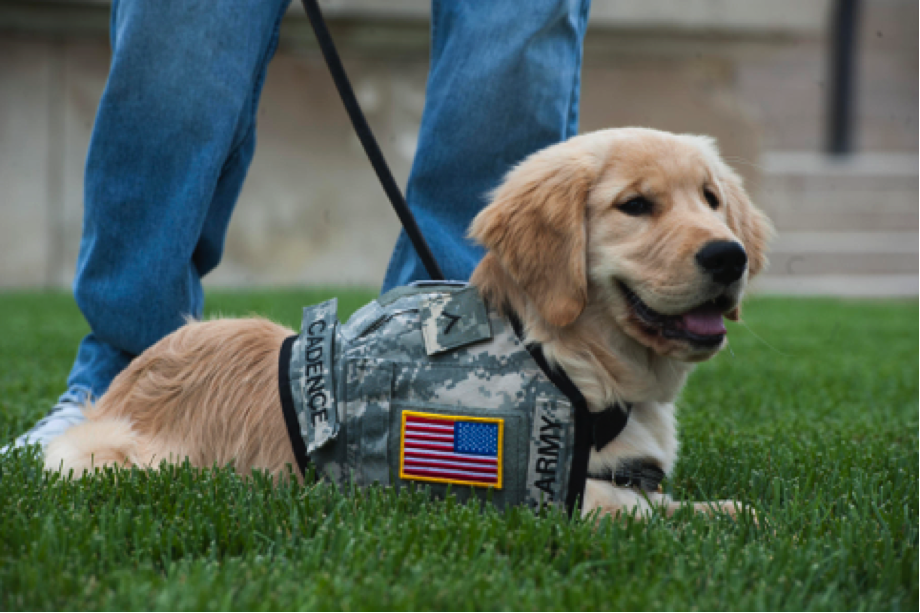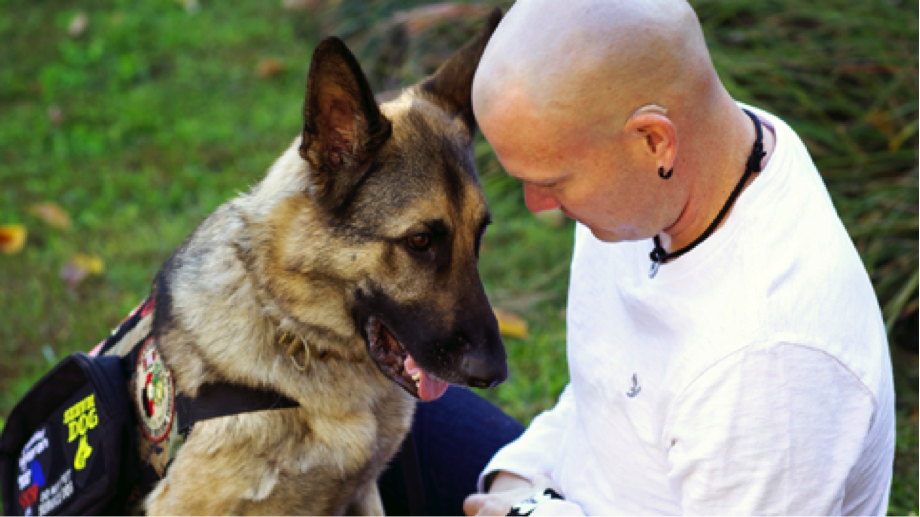
In the United States, veterans who are suffering from any physical or mental impact from war can use service animals. For example, many veterans may suffer from PTSD or have injuries which require 24/7 support. By having a service animal, they are able to lead a more independent life.
PTSD
Post-traumatic stress disorder is a psychological disorder caused by a stressful, traumatic and often harmful event in someone’s life that impacts their future. Someone with PTSD will relive the events in their mind often in nightmares and flashbacks which causes negative feelings of guilt, upset, isolation, depression and physical side effects such as nausea, sweating and heart pounding. For veterans, many people who went to war suffer from PTSD, particularly if they saw some horrible sights. There are many techniques uses to try help relieve the symptoms of PTSD including therapy and medication. One relatively new and effective way to help someone what the hell PTSD is to allow them to have a service animal for emotional support.
Service dogs are trained to recognize any signs of the disorder including anxiety, depression, and nightmares. They are trained to be unobstructed in public and recognize the first signs of PTSD related symptoms. Once they have been paired with an owner, they will adapt to their needs and carry out more complex tasks including retrieving medication, picking up dropped items, reminding the veteran to take medication or do a specific task, turning lights off/on and opening and closing doors.
Deep Pressure Stimulation
This is a technique used when the veteran is starting to feel anxious or panicked which could be the start of flashback. Service dogs are trained to sense these feelings in their user and carry out deep pressure stimulation. To do this, they use their body weight as a grounding mechanism to illiterate the anxious, panic feelings.
Tactile Interruption
A service dog will be able to sense when their owner is having a flashback or nightmare. When they do, they will carry out a tactile interruption where they will nudge, lick or paw their owner until they wake up or their mind is out of the flashback.
Hypervigilance
Many veterans struggle in public places where they have to have their back turned to something, such as people when in line in a shop or at the ATM machine. By having a service dog, veterans are able to feel more comfortable when going to the shops, allowing them to live a more normal life. The service dogs will watch their veteran’s back whilst they do what they need to, in the shop, at the ATM machine or anywhere else in public. By doing this, the service dog is protecting their owner and helping them feel more secure and safe.



Mobility
If a veteran returned from war injured, they may get a service dog to help aid their mobility. Many veterans have limited mobility, amputations, wheelchair-bound or visual and hearing impairments from war conflict. Service dogs can help veterans who develop physical impairments. A service dog can be very beneficial for a veteran who has encounter mobility impairments from their service in the armed forces. Service dogs are trained to provide support and care for their owner.
For veterans, life can be difficult once returning to ‘normal life’, particularly if they have suffered from injury or have diagnosed PTSD. A service dog can help a veteran return to normal routine, whatever their problem is.
Mobility is a big problem post-war however the support of a service dog can help veterans with everyday tasks that they may find difficult to carry out. For example, a veteran who lost a leg in the war may need some extra support in their everyday routine tasks. A service dog is trained to help open and close doors, pick up items such as medication and be used as a resting place or brace when moving in and out of a wheelchair. These simply take that a service dog provides will help a veteran become more independent and happier.
The use of a service dog for a veteran is very beneficial. It is important to note that all service dogs go through rigorous training programs to ensure they are equipped with the right skills to provide 24/7 assistance to a veteran. One particular program, the aura resiliency has been particularly designed by ThisABLE Veteran which allows veterans to undergo a 3-week training program and get matched with a service dog. Throughout the program, the veteran will learn the mechanisms of PTSD, how the service dog will support them and how to take back control of their lives, with techniques to do on their own as well as with their service dog.